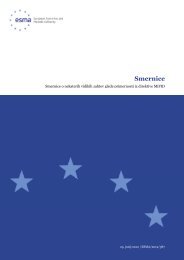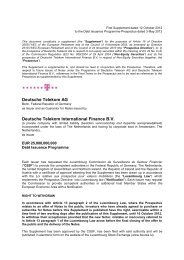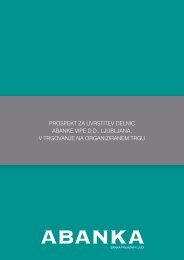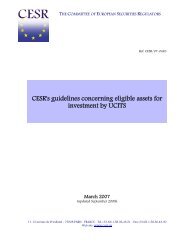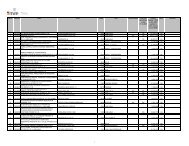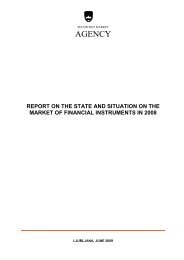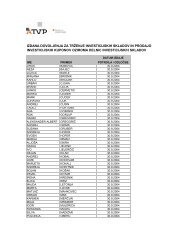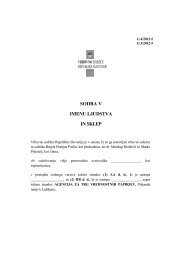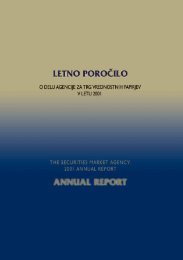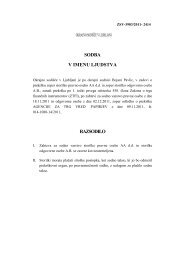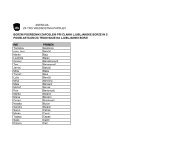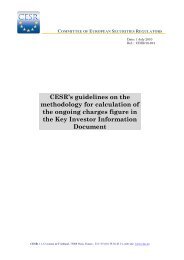OtherThe Federal Network Agency published its final decision on fixed-network termination charges on29 September 2011. For the most important rate options "termination" and "origination" at the lowestnetwork level, the rate approval resulted in a reduction from EUR 0.54 per minute to EUR 0.45 perminute at peak times and from EUR 0.38 per minute to EUR 0.32 per minute at off-peak times. Theapproved rates came into effect on 1 July 2011 and are valid until 30 November 2012. On18 April 2012, the Federal Network Agency's draft regulatory orders for fixed-network termination (IC)and mobile termination (MTR) were published. Although the Federal Network Agency does not plan tofurther tighten regulation through a "pure LRIC" approach for the regulation of charges, there is still arisk that charges will be cut further. In addition, the scope of regulation was also extended to fixednetworktermination in next-generation networks.The Federal Network Agency has also retroactively reviewed the rates charged by Deutsche Telekomfor the provision of customer data to providers of directory inquiry services and the publishers oftelephone and business directories to determine whether they are abusive. On 20 September 2010, itruled that any charges exceeding EUR 1.6 million per annum for the provision of data are abusive.Deutsche Telekom has initiated legal proceedings against this decision. Until a court ruling has beenissued, this decision of the Federal Network Agency is binding.The revised German Telecommunications Act includes a new article (§ 41a para. 1 of the GermanTelecommunications Act) that applies to all telecommunications-network providers and grants theGerman government competence to impose an ordinance specifying general requirements of nondiscriminatorydata traffic and non-discriminatory access to content and applications. The Germangovernment has discretion to issue such an ordinance, which will depend on ongoing publicdiscussions on net neutrality as well as the actual developments in the market. There are noregulations regarding net neutrality issued by the Federal Network Agency.Southern and Eastern European Telecommunications RegulationDeutsche Telekom's subsidiaries in Greece, Hungary, Romania, and Slovakia are subject to the sameEU Framework as its fixed-line business in Germany. Deutsche Telekom also operates fixed-linenetworks in Croatia, the F.Y.R.O Macedonia and Montenegro. These countries are also orientatingtheir regulatory frameworks towards the EU Framework. Therefore, all of Deutsche Telekom'ssubsidiaries in Southern and Eastern Europe are generally exposed to a set of regulatory risks similarto those in Germany described above. In the fixed network, Magyar Telekom (Hungary) was obligatedto provide access to all elements of the access network and to give the market at least six monthsnotice of the build-out of the fixed network. In Croatia, in a decision by the regulatory authority on21 March 2012, the regulation of Hrvatski Telekom and Iskon Internet was extended to include theretail market for broadband Internet access and the broadcast of television programs, with ex-anteprice regulation. In the fixed-network business, the highest cuts in termination rates were at DeutscheTelekom's subsidiaries and associates in Greece and Romania. At OTE in Greece, termination ratesfor wholesale services including unbundled local loop lines (ULLs) were reduced. Fixed-networktermination rates were reduced in Romania.Mobile RegulationDeutsche Telekom's subsidiaries in Germany, Austria, Bulgaria, the Czech Republic, Greece,Hungary, The Netherlands, Poland, Slovakia and Romania are all subject to the EU Framework.Deutsche Telekom also operates mobile networks in Croatia, the F.Y.R.O Macedonia, Montenegroand Albania. These countries are also orientating their mobile regulatory frameworks towards the EUFramework. All of Deutsche Telekom's mobile subsidiaries are generally exposed to regulatory risks.In mobile communications, the regulatory authorities in Greece, the Czech Republic, Slovakia andBulgaria proposed in some cases substantial reductions in mobile termination rates. In the first quarterof 2012, the mobile termination rates (MTRs) at Deutsche Telekom's subsidiaries and associates inRomania, Slovakia, Croatia, and Hungary were reduced as a result of regulatory decisions.In mobile communications, 2012 and 2013 will see the extension of expiring licenses and theassignment of new frequencies in Germany as well as at foreign subsidiaries. This will give rise togeneral risks from the uncertainty with regard to the scope and availability of future spectrum as wellas in terms of the costs of acquiring frequency spectrum. In Hungary, a new state-owned mobilecommunications company will enter the market in 2012 following the awarding of frequency.58
Incumbent network operators are obligated to offer upstream services to this company. MagyarTelekom has appealed against the frequency award.European UnionIn July 2009, a new EU roaming regulation came into force and expanded the existing roamingregulation to SMS and data roaming services. This 2009 regulation will be valid until 30 June 2012.Besides additional reduction of wholesale and retail voice roaming tariffs, SMS roaming charges werereduced and price caps for wholesale data roaming tariffs and additional transparency measures wereintroduced. This expansion of existing regulation has an additional negative effect on DeutscheTelekom's roaming revenues.On 1 July 2010, a spending cap was introduced for all customers who did not expressly opt out. Thedata roaming connection is automatically interrupted once EUR 50 (net) is spent, until the customeractively confirms he or she wants to continue using the connection and incur further costs. The currenttariffs of the EU Roaming Regulation entered into force on 1 July 2011. Since then, outgoing callswithin the EU have cost EUR 0.35 plus VAT and incoming calls have cost EUR 0.11 plus VAT. Theinter-operator tariff ("IOT") was reduced to EUR 0.18 plus VAT. Prices for text messages sent orreceived remained unchanged at EUR 0.11 and EUR 0.04 respectively, plus VAT. For data roaming,the IOT was reduced from EUR 0.80 to EUR 0.50 per megabyte.The future of the EU roaming regulation following the expiration of the current regulation in July 2012is currently being discussed by the EU. In its Digital Agenda for Europe, the European Commissionissued the political goal of abolishing the differences between national and roaming rates in the EU by2015.The European Commission's proposed new roaming regulation of 6 July 2011 aims to tighten andextend existing price regulation and the European Commission has also stated that it wants topromote competition. To this extent, a general obligation to provide wholesale access, for MNVOsamong others, is to be introduced in 2012. The unbundling of roaming services and national servicesis to be introduced in 2014, at which time consumers will be able to conclude a separate contract withanother provider exclusively for roaming services. The EU Commission's draft of a new RoamingRegulation dated 6 July 2011 is to be adopted in June following a compromise concluded between theEuropean Parliament and the European Council on 27 March 2012 and is to enter into force on 1 July2012. The conditions were tightened compared with the draft from 6 July 2011, in that the price capsare to be even lower than previously planned. The comprehensive wholesale access obligation – forMVNOs and others – remains unaffected, as is the unbundling of roaming and national servicesplanned from July 2014. These measures will consume a large amount of resources and incur highcosts for the European mobile communications industry.GermanyThe Federal Network Agency has the obligation to review markets every two years. On24 February 2011, the Federal Network Agency approved the new rates for call termination in nationalmobile networks to be applied retroactively by Telekom Deutschland with effect from 1 December2010. This involved reducing Vodafone and Telekom Deutschland GmbH's previously asymmetricrates by around 50%, making them de facto symmetrical. The Federal Network Agency's rate rulingwas the subject of consultation throughout the EU. These rates will expire on 30 November 2012.On 18 April 2012, the Federal Network Agency's draft regulatory orders for fixed-network termination(IC) and mobile termination (MTR) were published. Although the Federal Network Agency does notplan to further tighten regulation through a "pure LRIC" approach for the regulation of charges, there isstill a risk that charges will be cut further. In addition, the scope of regulation was also extended tofixed-network termination in next-generation networks.In May 2010, Telekom Deutschland GmbH purchased spectrum through auction in the 800 MHz,1.8 GHz, and 2.6 GHz frequency ranges and by the end of October 2010 had received assignmentnotices from the Federal Network Agency for all frequencies purchased. The coverage requirementsstipulate for the 800 MHz range that network operators must start rolling out LTE in towns andcommunities that have very little or no broadband coverage. Broadband coverage is to be increased to90% of the population in these gaps by the start of 2016. Roll-out is to be in stages based on thenumber of inhabitants, beginning with municipalities with populations of 5,000 or less. Otherbroadband coverage provided by Deutsche Telekom or other operators (e.g., DSL or UMTS) with a59
- Page 1 and 2:
Debt Issuance Programme ProspectusD
- Page 3 and 4:
Responsibility StatementDeutsche Te
- Page 5 and 6:
to form and content, and all rights
- Page 7 and 8: Maturities:Form of Notes:Fixed Rate
- Page 10 and 11: Summary in respect of Risk FactorsR
- Page 12 and 13: Notes may not be a suitable investm
- Page 14 and 15: Internationalisation and Sustainabi
- Page 16 and 17: German Translation of the SummaryDi
- Page 19 and 20: Besteuerung:Vorzeitige Rückzahlung
- Page 21 and 22: Zusammenfassung der RisikofaktorenZ
- Page 23 and 24: Zusammenfassung der Risikofaktoren
- Page 25 and 26: Unternehmen aus diesem Grund zusamm
- Page 27 and 28: Risk FactorsProspective investors s
- Page 29 and 30: markets. These developments could,
- Page 31 and 32: consumer regulation at the federal
- Page 33 and 34: Existing mobile substitution effect
- Page 35 and 36: exacerbated by the global economic
- Page 37 and 38: are subject to several individual l
- Page 39 and 40: While Deutsche Telekom believes tha
- Page 41 and 42: exposed to the risk of an unfavoura
- Page 43 and 44: principal under such Notes may even
- Page 45 and 46: Statement of cash flows (page 9 in
- Page 47 and 48: otherwise agreed between the Issuer
- Page 49 and 50: DESCRIPTION OF BUSINESSGroup Organi
- Page 51 and 52: In February 2011, T-Mobile Czech Re
- Page 53 and 54: 2010. The demand for ever-faster da
- Page 55 and 56: Special Requirements Applicable to
- Page 57: Local Loop AccessDeutsche Telekom h
- Page 61 and 62: (e.g., avoid disclosure or blocking
- Page 63 and 64: PTC as Deutsche Telekom clarified t
- Page 65 and 66: combinations of businesses where De
- Page 67 and 68: For more information on the effects
- Page 69 and 70: • Other operating expenses increa
- Page 71 and 72: 345Includes expense relating to a c
- Page 73 and 74: investment levels to remain approxi
- Page 75 and 76: products and technologies, these in
- Page 77 and 78: Reconciliation of Net Debt31 Dec. 2
- Page 79 and 80: Deutsche Telekom's cash outflows fo
- Page 81 and 82: 1In addition to the fixed-network l
- Page 83 and 84: Development of Operations2011 2010
- Page 85 and 86: to upgrade its mobile network, prov
- Page 87 and 88: Czech Republic. Deutsche Telekom ha
- Page 89 and 90: decrease mobile termination rates,
- Page 91 and 92: The decrease in adjusted EBITDA in
- Page 93 and 94: In 2011, the United States operatin
- Page 95 and 96: The increase in total revenue in 20
- Page 97 and 98: solutions. It also manages and deve
- Page 99 and 100: In 2010, T-Systems substantially ex
- Page 101 and 102: 2011 2010 Change ChangeOf which: Vi
- Page 103 and 104: conditions for additional capital m
- Page 105 and 106: For additional information on the c
- Page 107 and 108: Employees in the Group 31 Dec. 2011
- Page 109 and 110:
Civil servants employed by Deutsche
- Page 111 and 112:
Selected Financial InformationDeuts
- Page 113 and 114:
(Vorlagebeschluesse) with respect t
- Page 115 and 116:
Court of Justice annulled these jud
- Page 117 and 118:
having to pay license fees and comp
- Page 119 and 120:
Civil ServantsIn November 2004, Ger
- Page 121 and 122:
majority holdings by 2 May 2015, on
- Page 123 and 124:
Group Accounting manages the proces
- Page 125 and 126:
Deutsche Telekom International Fina
- Page 127 and 128:
Statement of comprehensive incometh
- Page 129 and 130:
Terms and ConditionsThis Series of
- Page 131 and 132:
"Global Note" means [the/any] [Temp
- Page 133 and 134:
interest shall continue to accrue o
- Page 135 and 136:
7 February 1992), the Amsterdam Tre
- Page 137 and 138:
Period is a day other than the 30th
- Page 139 and 140:
[in the case of Definitive Notes in
- Page 141 and 142:
([4]) of this § 6.](b)Notice of re
- Page 143 and 144:
of Stock Exchange], a Paying Agent
- Page 145 and 146:
(f)(g)the Issuer [in the case of No
- Page 147 and 148:
§ 14[(5)] to the Agent. Such notic
- Page 149 and 150:
Garantin] noch der Fiscal Agent ode
- Page 151 and 152:
Bei Rückzahlung oder Zahlung einer
- Page 153 and 154:
(b)Fällt ein Zinszahlungstag auf e
- Page 155 and 156:
[Sofern eine andere Methode der Bes
- Page 157 and 158:
[im Falle von Actual/360: die tats
- Page 159 and 160:
Für diese Zwecke bezeichnet "Zahlt
- Page 161 and 162:
Eine solche Kündigung darf allerdi
- Page 163 and 164:
(i)[Referenz-Preis einfügen] (der
- Page 165 and 166:
[(e)(f)von einer Zahlstelle abgezog
- Page 167 and 168:
(b)(c)(d)die Nachfolgeschuldnerin a
- Page 169 and 170:
eine vertretungsberechtigte Person
- Page 171 and 172:
(d)(e)(f)(iii)(iv)(v)(vi)by reason
- Page 173 and 174:
Non-binding translation of the Guar
- Page 175 and 176:
ganz oder teilweise in irgendeiner
- Page 177 and 178:
Tag der Begebung: [ ]These are the
- Page 179 and 180:
CURRENCY, DENOMINATION, FORM AND TI
- Page 181 and 182:
INTEREST (§ 4) 8ZINSEN (§ 4)o Fix
- Page 183 and 184:
oooooo ISDA Determination 9ISDA-Fes
- Page 185 and 186:
Instalment Amount(s)Rate(n) [ ]Earl
- Page 187 and 188:
GOVERNING LAW (§ 14)ANWENDBARES RE
- Page 189 and 190:
German Securities Code [ ]Deutsche
- Page 191 and 192:
Umfassende Erläuterung darüber, w
- Page 193 and 194:
Various categories of potential inv
- Page 195 and 196:
Commissions 29ProvisionenManagement
- Page 197 and 198:
Die Emittentin hat die Informatione
- Page 199 and 200:
Payment of the flat income tax will
- Page 201 and 202:
Kingdom of the Netherlands.Where th
- Page 203 and 204:
ResidentsAccording to the law of 23
- Page 205 and 206:
(c)account or benefit of, U.S. pers
- Page 207 and 208:
4. United KingdomEach Dealer has re
- Page 209 and 210:
Names and AdressesIssuersDeutsche T
- Page 211:
2010 2010PricewaterhouseCoopers Akt



